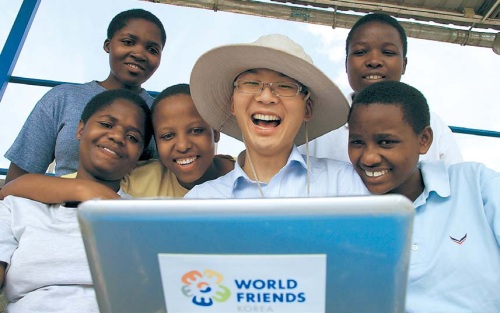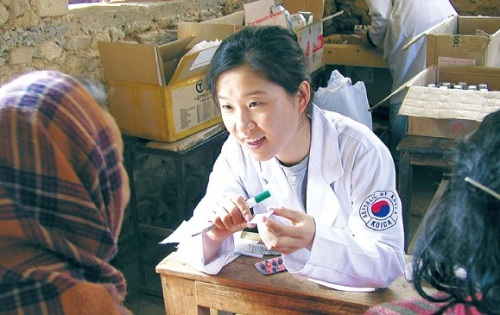World Friends Korea an example of change from donation recipient to donorFor 29-year-old Noh Hayejin, experience teaching in Tanzania has changed the course of her career as well as the quality of science education for the students she taught.
“I used to teach children from affluent neighbors at an expensive cram school. Then I thought I could use my talent and skill for the underprivileged deprived of adequate education,” Noh told The Korea Herald.
Noh was one of the 4,397 Korean volunteers sent to 54 countries in 2011, mostly in Asia and Africa, to help local people lead better lives by providing know-how in their specialized fields.

A World Friends Korea volunteer poses with children. (Korea International Cooperation Agency)
Launched in 1990 with 44 volunteers dispatched to Nepal, Sri Lanka, Indonesia and the Philippines under the management of the Korea International Cooperation Agency, the volunteer program has been operating in more than 90 countries.
By 2013 World Friends Korea, modeled after the U.S. Peace Corps, will have sent more than 20,000 volunteers to every corner of the world.

A World Friends Korea volunteer doctor gives medical instruction to patients.
The expansion of the program is an example of Korea’s emergence as a donor country on the international stage. It is a clear example of a country transformed in a short period of time from one of the poorest nations in the world, devastated by the Korean War, into a country that helps others.
Under the program, volunteers are given positions where they can best use their expertise. The areas include education, health, rural development, information and communication technology and sports.
Jeon Jae-jun, a 28-year-old taekwondo major at college, went to Vietnam in December 2008 to teach the Korean martial arts to students at a Hanoi police academy.
“I always wanted to use what I have learned in a better way,” Jeon said.
Jeon decided to complete his mandatory military duty in Korea by teaching taekwondo to Vietnamese students as an alternative duty.
Thanks to the Korean Wave in Vietnam, his taekwondo class was very popular among students as the number of students who applied for the class exceeded the original target of 30 to 100.
“I felt really great watching myself teach students in the uniform with Korean flag on it. It was a great experience because I contributed to promoting the image of Korea and its culture to foreigners,” said Jeon.
The overseas volunteer program is not just for young people trying to find meaning in their lives.
Retirees make great contributions to bettering the lives of the poor in practical ways by passing on their knowledge and expertise.
Kang Seung-kyu turned a once barren area for cattle breeding into fertile land for crops during his volunteer work from 2008-2011 in Tunisia.
Started with seven farms, the 61-year-old agriculture expert taught poor farmers to diversify their sources of income.
He taught them how to grow Asian vegetables such as cabbage, white radish, lettuce and chili to sell to Asian residents in the country.
“I was able to increase their vegetable sales profits by 120 percent per annual income of each farm in 2010,” Kang said.
He extended his stay in Tunisia one year and selected five more farms where he was to pass on know-how of growing summer crops such as sweet potatoes, chili, corn and leaf vegetables. He also picked mushrooms as a high value-added product so that more farmers can earn profits by exporting them.
Kang’s works have diversified the nutrition available to residents living in mountainous regions whose food options were limited to bread.
He bought sweet potato seeds from Korea and planted them in the mountainous high land.
Chung Soon-kyung, a 68-year-old horticulture expert, also presented a new source of income to Algerian farmers.
Originally sent to teach them how to grow roses for export, he found the Algerian farm infrastructure utterly insufficient for the task.
“Nothing was prepared at that time. So I thought I could start with cabbage which is relatively easy to grow,” said Chung.
Algerian farmers grew cabbage and sold them to Koreans and Chinese living in the country.
He couldn’t teach them how to grow roses, but taught Algerian students and farmers basic knowledge of agriculture and horticulture.
“If I weren’t this old, I could go to another country to help more people,” said Chung.
Their volunteer work has helped promote the image of Korea overseas.
“People are fond of Korea because its companies and people actually contribute to the economic development of their country and let them stand on their own feet even after volunteers leave,” said Chung.
“In many countries, people used to mistake Koreans for either Chinese or Japanese, but as the volunteer program starts to bear fruit, people started to recognize us as Koreans,” said Jeong Yong-woo, coordinator of WFK program operating team.
Cho Hyun-ah works to spread the Korean language and culture in Peru.
She has recently opened a Korean language course at the National University of Trujillo.
And the volunteers’ contributions don’t stop with the end of their term.
“I applied for a position as an interpreter for refugees who come to Korea. I learned Swahili when I was trained to go to Tanzania at KOICA and I want to use it for those who need me,” said Noh.
Noh said she is planning to launch a project with others to create children’s books for Tanzanian children.
Jeon also plans to continue volunteering with World Taekwondo Peace Corps, a volunteer organization promoting the martial art and Korean culture overseas.
“Many people in partner countries say volunteers have changed their lives for the better, expressing appreciation,” said Jeon.
Volunteers play a major role in forging friendship between Korea and other countries.
“I would like to go on to build friendships with foreigners, so I continue to communicate with them while promoting the Korean culture,” said Jeon.
By Lee Woo-young (
wylee@heraldcorp.com)





![[KH Explains] No more 'Michael' at Kakao Games](http://res.heraldm.com/phpwas/restmb_idxmake.php?idx=645&simg=/content/image/2024/04/28/20240428050183_0.jpg&u=20240428180321)


